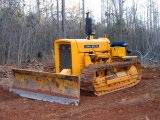Stretch wrote:. . . basically the only difference between an alternator and a generator is the speed in which it will charge or maintain the electrical system.
Allbeit the alternator is rectified and would charge at idle, the generator needed to speed up to do the same amount of charging. Other than having an external regulator I believe the generator is as good a device as the alternator.
Well, I guess you'd have to define the meaning of "good."
There are several major differences between the two. They are both generators, but for purposes here, I'll call the older cast iron units on tractors the "generators", and the more modern aluminum units with rectifiers "alternators."
A generator depends on the brushes to carry charge current, so brush wear is MUCH faster than with a modern alternator and brush tension more critical.
A generator makes AC power, but . . . by placement of the brushes in proximity to the armature, only uses about half the power made. It selects half the AC pulses to make DC.
A generator also relies on a mechanical regulator with contact points, that is subject to wear, like any moving electrical part, switch, contactor, etc.
An alternator uses all the power made by coverting AC sine-wave pulses via rectifiers into direct current, so it is MUCH more efficient than a generator.
Also, an alternator only uses the brushes to carry exciter field current, not charge current - so brushes can almost last forever.
Also, most alternators have electronic regulators - and you can add one to any alternator that did not have it originally.
My point is, there is a huge difference between the two. Does it matter on an old part-time use tractor? All depends on what you use it for. Stick a couple of big headlights on your tractor with an old 10 or 20 amp generator and see how well it works at low engine speeds. Not well at all. A cheap junkyard $15 alternator can make 30-40 amps with the engine idling, whereas a 20 amp generator can barely make 5 amps with the engine iding.
Keeping the generator on an old tractor for cosmetic reasons certainly makes sense. But otherwise, I can't think of a good reason. A generator is more unreliable, has much lower output per size and weight, and is much more exspensive to maintain.
I'll add, that we did all our own injection pump, generator, alternator work, etc. at every dealership I worked at. With charging systems, the generator systems required more more maintenace per work done, as compared to any alternator system. Keep in mind that with many older tractors, all the generator had to do is keep the battery charged at a 2-5 amp rate. Whereas, many modern tractors might be running all night long with many lights running, high current draw attachments hooked up, etc. It's kind of an apples to oranges comparison since most older generator systems could not be made to do near as much work as the alternator systems.



